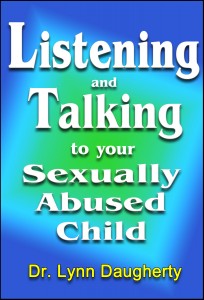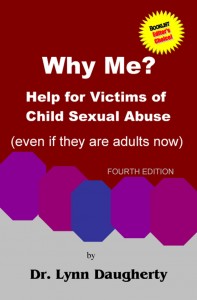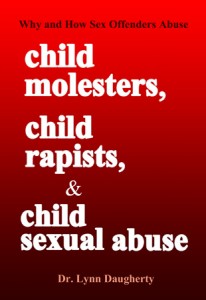Helping Your Sexually Abused Child: Listening to Your Child Gives Your Child Important Information
A Selection from Dr. Daugherty’s book, Listening and Talking to Your Sexually Abused Child
(Child sexual abuse trigger warning and disclaimer)

Paperback $7.95 (US).
Available from these booksellers.
While you are learning significant information by paying attention to what your child says, you are also giving your child important information, just by listening to him.
The first important message you give your son by listening (not talking, but listening to him) is that you care enough about him to want to know what he thinks and how he feels. You are telling your son he is worth your time and attention. He needs to know you care about him this much.
The second important message you give your son by listening to him is that his experiences are something he can discuss. They are not something shameful he must hide, or something too terrible to talk about.
Some parents are afraid that discussing sexual abuse or aftermath events will upset their child. It is true, talking about these experiences may be painful for him (and you), but not talking about them is even more painful.
If experiences are “hushed up,” your son can think you are ashamed of what happened to him. He is likely to take on that shame as well. His self-esteem suffers as he starts seeing himself as bad and his actions as shameful.
If the abuse is never mentioned, your son may also get the message that what happened is too horrible even to discuss. He may come to view his experiences as a terrible catastrophe, one so monstrous that it will rule his life forever.
Therefore, the second important message you give your child by listening is that the sexual abuse can be discussed. You are not ashamed of the abuse and it is not too terrible to hear about.
This leads to the third important message you give your son by listening, which is that you are a strong person. You can stand to hear what happened and to hear how he feels right now, whatever that may be.
If the abuse is never discussed, he may come to believe that you are too fragile to handle talking about, or even thinking about, these events. Then he, with his already overwhelmed resources, must also worry about protecting and supporting you. He needs to know you are not someone he must protect, but a person strong enough to take care of him. Your child needs to be able to count on your strength and support right now.
So by listening to your child you are giving him three important messages he needs to hear: “I care about you,” “It’s OK to talk about your experiences,” and “You can count on me to be strong.”
Read real stories of victims of child molestation, rape, or incest.

Paperback US $7.95
At Amazon.com and most booksellers

Paperback US $12.95
At Amazon.com and most booksellers

Paperback US $9.95
At Amazon.com and most booksellers
How does child sexual abuse happen? How and why do child molesters and rapists abuse children?
Find other Questions and Answers about child sexual abuse as well as help and healing for victims.
Has your child been abused? Learn how to help your sexually abused child by talking as well as listening.

Paperback US $7.95
At Amazon.com and most booksellers
© Cleanan Press, Inc. 2004 – 2020
